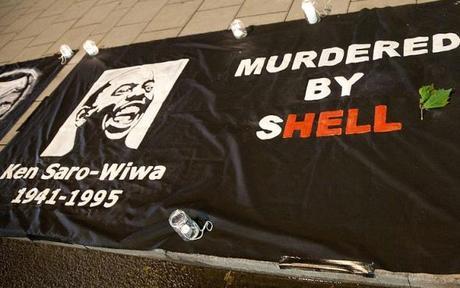
A vigil for Ken Saro-Wiwa and the Ogoni 8. Many people believe Shell was complicit in the murders of the activists. Platform London under a Creative Commons Licence
By Celestine AkpoBari / New Internationalist
November 10 marked the 18th anniversary of the state execution of writer and activist Ken Saro-Wiwa and the ‘Ogoni 8’.
Not long ago, the Governor of our state in Nigeria said to the Ogonis: ‘Why can’t you people move on?’ The simple answer is that since Ken’s death in 1995 nothing has been done to stop the devastation brought about by unwanted, dirty oil extraction in our homeland.
In the 1950s, before Nigeria won independence, Shell was given the right to drill oil. Ken Saro-Wiwa, like me, was from Ogoniland, an area of the Niger Delta which, like many others, was destroyed by the reckless exploitation of international oil companies, in particular Shell. Saro-Wiwa’s tireless campaigning let the international community know about our struggle – the conflict, pollution, loss of livelihood, food and drinking water. Ken also gave us hope by inspiring us to mobilize against the military government and Shell.
In 1990, Ken wrote the Ogoni Bill of Rights, which catalogued the Ogoni people’s demands for environmental, socio-economic and political justice. It was presented to the Nigerian Government in the early 1990s, but there has yet to be any response to the document. Despite this, it has functioned as the bible of the Ogoni struggle and became an organizing document to orientate our struggle.. It eventually inspired other ethnic nationalities in the Niger Delta to produce similar charters as a peaceful way of pressuring the Nigerian Government into dialog and action.
Ken and the Ogoni 8 were murdered for standing up to Shell. But they were part of a movement that ultimately achieved a spectacular result: Shell was forced to leave Ogoniland. And, despite Shell’s efforts, popular protest has prevented it from ever returning. Since then, we have served as an inspiration to communities all around the world who are resisting multinational companies.
But this victory has not brought an end to our suffering. Shell owns the pipes that cross Ogoni bringing oil from the rest of the region to the port for export to countries like Britain. Spills occur regularly. In a place where fishing and farming are the main livelihoods and where people drink from streams and wells, decades of oil spills mean hunger, disease and poverty. Many people have been forced to leave their communities. Oil companies are supposed to clean up spills whatever the cause but this has not happened.
In August 2011, The United Nations Environment Programme (UNEP), released the first scientific analysis of pollution in Ogoniland. It confirmed all that Ken had said – that Ogoni has been turned into an ‘ecological disaster.’ The report found that without exception all the water bodies in Ogoniland were polluted by the activities of Shell and the Nigerian National Petroleum Corporation. The report stated that some drinking water had carcinogens such as benzene up to 900 times above World Health Organization standards. It perhaps explains why life expectancy in the Niger Delta is about 45 years. Most people cannot even remember a time before their homeland was devastated. The report estimates that the clean up will take about 35 years so even if it was started now, many people will not reap the benefits in their lifetime.
This report should have been the catalyst for action. But nothing has been done by Shell or the Nigerian Government in the two years since it was released, despite the profits reaped on the oil taken from our land. This has prompted a House of Representatives investigation, announced this week. On 10 November we gathered to remember Ken and his dream of a clean, safe Ogoniland. But this date was also a deadline that we gave for our demands for the clean-up, land rights and political reform. If we do not see action we will be forced to resurrect the struggle in Ken’s name through a campaign of peaceful protest and disruption of oil infrastructure in the Niger Delta leading up to 2015.
We are calling on the international community to stand in solidarity with our struggle and to organize to target the international oil companies that are operating with impunity in the Niger Delta. There is a check for the Ogoni people to cash in 2015 and it is written in blood. To repeat the last words of Ken Saro-Wiwa: ‘The struggle continues’.
Celestine AkpoBari is a community activist from Ogoniland. He is the founder of the Ogoni Solidarity Forum and is involved with Social Action.
Find out more about the campaign in the Niger Delta.
- See more at: http://newint.org/blog/2013/11/11/ogoni-niger-delta-shell-ken-saro-wiwa/#sthash.fRp5Xk77.dpuf

